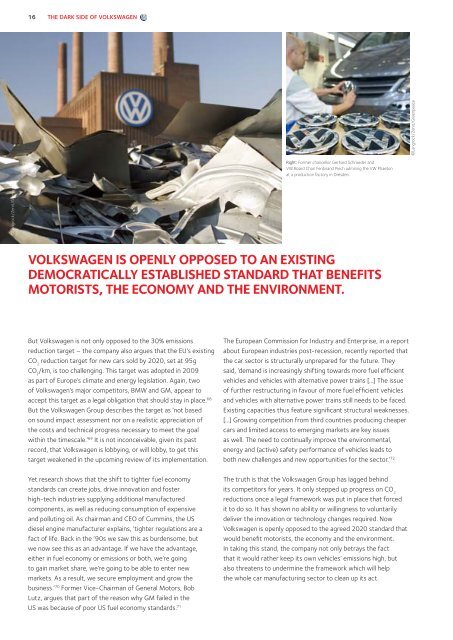The Dark Side of Volkswagen - Greenpeace
The Dark Side of Volkswagen - Greenpeace
The Dark Side of Volkswagen - Greenpeace
Create successful ePaper yourself
Turn your PDF publications into a flip-book with our unique Google optimized e-Paper software.
©Langrock/Zenit/<strong>Greenpeace</strong><br />
16 THE DARK SIDE OF VOLKSWAGEN<br />
But <strong>Volkswagen</strong> is not only opposed to the 30% emissions<br />
reduction target – the company also argues that the EU’s existing<br />
CO 2 reduction target for new cars sold by 2020, set at 95g<br />
CO 2 /km, is too challenging. This target was adopted in 2009<br />
as part <strong>of</strong> Europe’s climate and energy legislation. Again, two<br />
<strong>of</strong> <strong>Volkswagen</strong>’s major competitors, BMW and GM, appear to<br />
accept this target as a legal obligation that should stay in place. 68<br />
But the <strong>Volkswagen</strong> Group describes the target as ‘not based<br />
on sound impact assessment nor on a realistic appreciation <strong>of</strong><br />
the costs and technical progress necessary to meet the goal<br />
within the timescale.’ 69 It is not inconceivable, given its past<br />
record, that <strong>Volkswagen</strong> is lobbying, or will lobby, to get this<br />
target weakened in the upcoming review <strong>of</strong> its implementation.<br />
Yet research shows that the shift to tighter fuel economy<br />
standards can create jobs, drive innovation and foster<br />
high-tech industries supplying additional manufactured<br />
components, as well as reducing consumption <strong>of</strong> expensive<br />
and polluting oil. As chairman and CEO <strong>of</strong> Cummins, the US<br />
diesel engine manufacturer explains, ‘tighter regulations are a<br />
fact <strong>of</strong> life. Back in the ‘90s we saw this as burdensome, but<br />
we now see this as an advantage. If we have the advantage,<br />
either in fuel economy or emissions or both, we’re going<br />
to gain market share, we’re going to be able to enter new<br />
markets. As a result, we secure employment and grow the<br />
business.’ 70 Former Vice-Chairman <strong>of</strong> General Motors, Bob<br />
Lutz, argues that part <strong>of</strong> the reason why GM failed in the<br />
US was because <strong>of</strong> poor US fuel economy standards. 71<br />
Right: Former chancellor Gerhard Schroeder and<br />
VW Board Chair Ferdinand Piech admiring the VW Phaeton<br />
at a production factory in Dresden.<br />
VolKSwAgEn iS opEnlY oppoSEd To An ExiSTing<br />
dEMoCRATiCAllY ESTAbliShEd STAndARd ThAT bEnEFiTS<br />
MoToRiSTS, ThE EConoMY And ThE EnViRonMEnT.<br />
<strong>The</strong> European Commission for Industry and Enterprise, in a report<br />
about European industries post-recession, recently reported that<br />
the car sector is structurally unprepared for the future. <strong>The</strong>y<br />
said, ‘demand is increasingly shifting towards more fuel efficient<br />
vehicles and vehicles with alternative power trains […] <strong>The</strong> issue<br />
<strong>of</strong> further restructuring in favour <strong>of</strong> more fuel efficient vehicles<br />
and vehicles with alternative power trains still needs to be faced.<br />
Existing capacities thus feature significant structural weaknesses.<br />
[…] Growing competition from third countries producing cheaper<br />
cars and limited access to emerging markets are key issues<br />
as well. <strong>The</strong> need to continually improve the environmental,<br />
energy and (active) safety performance <strong>of</strong> vehicles leads to<br />
both new challenges and new opportunities for the sector.’ 72�<br />
<strong>The</strong> truth is that the <strong>Volkswagen</strong> Group has lagged behind<br />
its competitors for years. It only stepped up progress on CO 2<br />
reductions once a legal framework was put in place that forced<br />
it to do so. It has shown no ability or willingness to voluntarily<br />
deliver the innovation or technology changes required. Now<br />
<strong>Volkswagen</strong> is openly opposed to the agreed 2020 standard that<br />
would benefit motorists, the economy and the environment.<br />
In taking this stand, the company not only betrays the fact<br />
that it would rather keep its own vehicles’ emissions high, but<br />
also threatens to undermine the framework which will help<br />
the whole car manufacturing sector to clean up its act.<br />
©Langrock/Zenit/<strong>Greenpeace</strong>

















